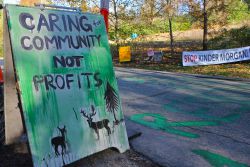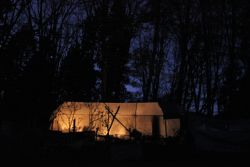Chaos and Community: Mental Health on Burnaby Mountain
BLOG POST posted on Mai 4, 2015 by kaleb
At 3 a.m. my alarm went off. It was time to take a turn watching over the sacred fire. I crawled out of my warm down sleeping bag, away from my warm partner, out of the front seat of our tiny car and into the crisp night air. The firelight was flickering and the mumblings of voices around the camp could be heard. I walked around the blockade made up of logs, cement blocks, detached statue heads and bits of metal among other things, and followed the flickering bike lights attached to traffic cones to find the entrance of the camp. There were a few other people around the camp who headed off to bed, but Josh stayed asleep in a folding chair and Tashanna whipped around the camp cleaning and redecorating.
The night was clear and the three of us were left alone. I crept close to the fire and stared at the night sky. It was peaceful yet eerie and unsettling. The sacred fire, lit by friends from the Sḵwx̱wú7mesh and Gitxsan nations, had been a constant source of strength and centering for the group holding down on the mountain. A traditionally caught salmon donated that night was slowly cooking in the flames, the only food ever cooked in them. As the salmon cooked, Tashanna took the donated fruit and vegetables and made an incredible display at the entrance to the camp. Apples cascaded into carrots that draped over grapes that sat amongst oranges. She stood back every few minutes to assess her work and adjusted each piece painstakingly. A palpable mix of anguish and revelation fueled the careful adjustment and at times it was difficult for me to watch. I occupied myself for a while with picking up garbage around the camp and organizing the camp kitchen. The tent overflowed with donations. Tins of soup, packages of cookies, bags of coffee, crockpots of home-cooked stews, tea bags and peanut butter jars covered the makeshift tables and filled the milk crates below. I found a sign pleading with visitors to "EAT SNACKS" and affixed to the pallet display. We were attempting to both keep the produce from going to waste and draw new people in with the promise of fresh snacks.
Josh, also known as “Hobbit”, soon woke up and was freezing cold without his shoes and with only a thin blanket. Tashanna quickly and kindly escorted the exhausted, shivering, unsettled Hobbit to her car and turned on the heater. Josh had showed up to the camp in the middle of the night in the pouring rain a few weeks back. He had seen an article about the camp in a paper and left immediately. When he arrived he wasn’t doing particularly well. He was disoriented and initially had a very difficult time communicating with the community. A few folks reached out and watched out for Josh. For better or worse they coaxed him off his medication replacing it with cannabis and hot food. He spent many nights alone keeping watch over the sacred fire, took his responsibility very seriously and reveled in the community and purpose. Off of his pharmaceutical medication his ideas came fast and relentless but he spoke of the freedom he had there and the chance it gave him to reflect and connect with others.
After tucking Josh in, Tashanna dragged the “borrowed” condo display signs that were donated to the camp and gave them a thick layer of paint to cover over the contractor logos and prep them for new messages. As I watched from the fire I started to feel the energy of the night, the camp, and the power of the land. I found a half-full tin of paint, a pleasing colour of green, and headed out onto the quiet mountain road. The moon shone brightly and I could just make out the lines on the pavement as I began to paint. The intensity of the last few months seemed to have hit me in the last few days and instead of making me tired it made me feel connected, focused and, almost frighteningly, invincible. The summer of visiting blockade camps in the Pacific Northwest, connecting with small town queer folks, reading books on systemic oppression, hiking on epic beaches and meeting phenomenally inspiring people pushed me to my limits. And I didn’t mind. I find myself seeking out that edge, searching for ways to get to places that feels outside of “normal”. These sorts of highs led me to be diagnosed as bipolar though and I have been medicated on and off for mental illness struggles since I was a teenager. The last 6 months had been intense and I sometimes feared for the emotional drop-off that tends to come after highs like these.
As the night faded I wrote in thick green capital letters across the road putting down as many layers of paint as I could with what was left in the can. I still have green streaks on my favorite jeans and the thin black gloves I wore to fend off the November chill still sit on my dashboard, 4 months later, more green than black. My partner Erin, wandered out to me on the road as I stood back down the road and surveyed my work. “LOVE AND RAGE” and “GRASSROOTS RESISTANCE” stood out in the early morning light. I realized the intensity of my energy in Erin’s calm presence and felt simultaneously ridiculous and emboldened. She looked at me with a lot of care and a little alarm. I was bubbling, and I’m sure, had wild eyes.
Back at the fire Tashanna’s eye make up had begun to cover much of her face but she continued to paint and create with anything and everything in the camp. It was beautiful, erratic, colourful, and her. We found a couple of paper cups and spoons and I used my pocketknife (dubbed the “chocolate muffin knife” because of its bluntness and it’s use on the often donated baked goods) to cut the salmon. We ate out of the cups and sat in the dreamlike state of the camp aware that this situation was very temporary, very unique but very true. Life in the colonial capitalist system we all live in gets ordered, organized, compartmentalized and disconnected. It seems like it is built to push away and deny the chaos and uncertainty that underlies it all. The challenging of this system is part of what made the camp on what is known as Burnaby Mountain, temporarily, very powerful.
Tashanna embraced the fight and the mess and even called herself the “Chaos Fairie”. She would come to the camp with dollar store bags stuffed with art supplies and seemed to always have a least a little bit of glitter on her face. She expressed joy and she expressed deep sadness and unrest in her words, her art and her movements. Tashanna and Josh had also been diagnosed bipolar, and all of us have been on and off medication. We shared a hurt, we shared an intensity and we shared a vision. The camp offered a unique opportunity to step out of the forced system of disconnection and artificial order and push into the chaos. We all reveled in it, and struggled in it.
During much of the resistance on the mountain community was created, people were affirmed, norms were questioned, boundaries were broken, and oppressive power and authority were denied. We ate together, supported each other and tested our beliefs. But it was messy and confusing and we f’d up. Tashanna, one of the people who most fully expressed and embraced the mess, the beauty and the pain, is gone now. Tashanna took her own life a few months ago on a pass from the hospital. This leaves us with holes in our hearts and more questions. Radical resistance, like mental health struggles seem to offer opportunities to challenge, to sit in uncertainty and not look for simple answers. It hurts and maybe there are no answers, only the need to accept the underlying chaos, beauty, joy and pain without attempting to cover it up or change it.
The site for the Vancouver local of The Media Co-op has been archived and will no longer be updated. Please visit the main Media Co-op website to learn more about the organization.

